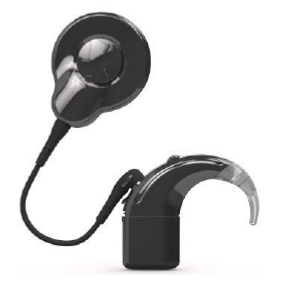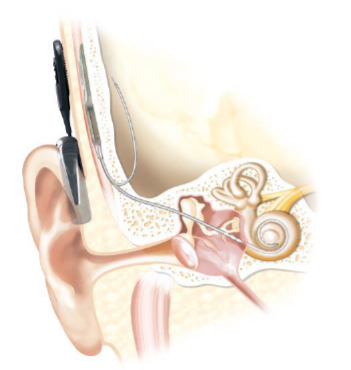Cochlear implants
This page gives you information about cochlear implants, how they work and who is eligible to have one fitted.
What is a cochlear implant?
A cochlear implant is an electronic device designed to improve the ability to hear for children and adults with severe to profound hearing loss.
Hearing aids can only amplify sounds to a limited degree. When hearing loss is severe or profound, hearing aids may not provide sufficient benefit.
Cochlear implants bypass the damaged part of the inner ear. Signals are sent directly to the hearing nerve and then to the brain, allowing sounds to be heard.
How we hear
The ear consists of 3 sections; the outer, middle and inner ear.
- The outer ear acts as a funnel to collect sound vibrations and send them through the ear canal to vibrate the eardrum.
- The middle ear contains the ear drum and 3 bones called the ossicles. These vibrate and send the sound to the inner ear.
- The inner ear contains the organ of hearing called the cochlea which converts sound vibrations into electric signals. These signals travel up the hearing nerve to the brain.
What does a cochlear implant look like?
This image shows an example of the external sound processor and headpiece. There is often a choice of colours.
How does a cochlear implant work?
A cochlear implant system has 2 parts:
- External sound processor and headpiece.
- Internal implant and electrode array – these are the parts implanted during surgery.
Microphones on the external processor detect sound which is converted to digital signals. These signals are sent to the internal implant via the head piece. The head piece is connected to the internal implant by a magnet.
The internal implant sits underneath the skin and receives the digital signals. These are sent through the inner ear to the hearing nerve via the electrode ray. The hearing nerve sends signals to the brain and the sound is heard in real time.
Who is suitable for a cochlear implant?
To be considered for a cochlear implant there are set criteria that must be met:
- You must have severe to profound hearing loss.
- You only receive limited benefit from hearing aids.
In the UK, most adults are offered a cochlear implant for one ear. Those who are registered blind will be offered cochlear implants for both ears.
Before being referred to a cochlear implant centre we will need to perform further hearing and/or speech tests to see if you are suitable for a referral.
Referral and implant centres
If suitable, you will be referred to a cochlear implant centre for further testing and the implant surgery. The implant centres we refer to are:
- Queen Elizabeth Hospital, Birmingham - www.uhb.nhs.uk
- St Michaels Hospital, Bristol - www.uhbristol.nhs.uk
- John Radcliff Hospital, Oxford - www.ouh.nhs.uk
Contact information
If you would like more information or an appointment to discuss cochlear implants, please contact us using the details below:
Tel: 0300 422 6919
Monday to Friday, 8:30am to 4:30pm
Enquiries: ghn-tr.hearing.services@nhs.net
Booking enquires: ghn-tr.audiology.appts@nhs.net
Further information
For more information about cochlear implants please visit:
National Cochlear Implant Users Association
Website: www.nciua.org.uk
Acknowledgement
The images on this page were provided courtesy of Cochlear® Limited 2023.

